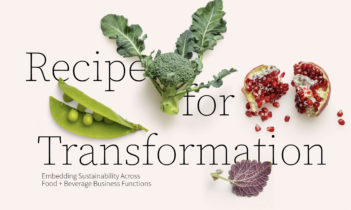Food + Beverage
The transformation of the food system is one of the strongest levers to keep global temperature rise to the 1.5°C cap. Will your business be part of the solution?
From farm to fork, sustainability needs to be integrated at every step of the value chain to protect food security and ensure the food and beverage sector’s resilience in a resource-constrained world.

We understand key industry challenges
We understand the challenges of the Food and Beverage industry. And every challenge is an opportunity.
Food is fundamental to our health, environment, society and economy, but our current food system — with its resource-intensive production model, unsustainable agricultural practices, heavy meat and dairy consumption, deforestation and food loss and waste — is a major driver of many of the critical environmental challenges we face today. The food and beverage industry has an opportunity to transform from the status quo by addressing these challenges across the value chain. The levers for sustainable transformation are many, and now is the time to act.
Regenerative agriculture practices
Implementing agricultural best management practices such as reduced or no-tillage and improved nutrient management are critical to transform and help you reach your targets.
Product portfolio transformation
Diversifying your product portfolio and shifting towards plant-based products will support the transition of the global food system to a safe operating space for both environmental and human health and food security.
Traceability + certification
Traceability is central to transparency, trust and sustainability, and the key to unlocking sector transformation. Technology-enabled end-to-end traceability and certification of raw materials can help companies ensure that sourcing is sustainable, improve reliability and efficiency of supply chains, and identify and mitigate risks faster. Agritech solutions can also advance traceability and transparency by increasing data granularity and quality.
Value chain partnerships
Knowledge sharing and pre-competitive initiatives are crucial to accelerating sustainable business transformation. Collaboration can facilitate the development of standardized approaches that deliver real impact, help scale the uptake of sustainability best practices on climate, water, biodiversity, plastics and packaging, and unlock the funding and resources necessary to implement change.
Digitalization + efficiency
Along with our digital partners, we’re enabling companies to significantly accelerate the pace of footprinting by improving efficiencies and redirecting resources to move from data gathering to action.
Quantis’ digital tool, eQosphere, enables companies to have access to EFs, and gain a better visualization and understanding the EFs. In this way, our partners gain deep knowledge about what’s behind the numbers. Our goal is to help you become more capable of making informed decisions with the data you have on hand.
Product portfolio transformation
With the use of Quantis’ eQopack, we’re enabling ecodesign packaging strategies and product transformation through improvements in recipes, packaging, and R&D efforts.
Key topics for the industry in 2024
The food and beverage sector has traversed a whirlwind of challenges, demonstrating resilience and adaptability in the face of constant change. As we move through 2024, the industry is at a pivotal crossroads, with the opportunity to redefine its impact on the planet and society.
To stay ahead and emerge victorious in this context, it’s imperative for food and beverage to integrate sustainability not just as a concept, but as a foundational pillar of their operations. Wondering where to begin? Charlotte Bande, Global Food & Beverage Lead at Quantis highlights the key topics and enablers that the industry should prioritize to foster resilience and accelerate sustainable transformation in this short video.
By focusing on these priorities, companies can navigate the complexities of the current landscape, drive meaningful change and contribute to securing a sustainable future for all.
How we can help
For nearly two decades, Quantis has supported the Food and Beverage Industry on its journey towards sustainable transformation. We partner with stakeholders across the value chain — from brands and processors to farms and trade bodies to retailers, associations and institutions — and engage in pre-competitive initiatives to assess impacts, plan sustainability pathways and transform the industry as a whole.
We strongly believe, by working together, a sustainable food system is mission possible.
Quantis Food + Beverage experts can help you to:
- Assess and map risks and impacts of your company and its products, applying deep expertise in the agricultural sector.
- Develop integrated science-driven strategies and roadmaps that target climate, biodiversity, water, land-use change and plastic leakage.
- Implement your strategy by providing change management support and developing corporate governance structures that enable, rather than undermine, your organization’s goals.
- Accelerate and scale sustainable innovation within the product portfolio to enhance transparency, drive dietary shifts and minimize food loss.
- Activate and engage the supply chain to support your transformation to build resilience and improve efficiency.
- Enable new and innovative business models to reduce environmental impacts, unlock new opportunities, prepare for future shocks and unleash the best version of your business.
- Shape credible, authentic and relevant brand communications on your sustainability efforts that resonate with your consumers and stakeholders, drive behavioral change and avoid greenwashing.
- Create partnerships between institutions, organizations and industry networks.

Trusted by more than 1200+ businesses

Case Study
illycaffè
illycaffè’s decarbonization roadmap for carbon neutrality

Case Study
Barry Callebaut
A new methodology to account for land-use change in the cocoa supply chain.

Case Study
Bel – Leerdammer
Using metrics to tell the story of packaging improvements to two different audiences: customers and consumers.
Related content
 Report
Report By Quantis
Recipe for Transformation
Discover our new report on embedding sustainability across food + beverage business functions.
By Quantis
Tracking Progress in the Supply Chain
Tracking Progress is a first-of-its-kind web-based guide designed to make the process of tracking change in the supply chain easier and more efficient than ever.

Webinar
SBTi FLAG target-setting in practice – lessons learned
Join us for this webinar to learn about what the new climate target-setting framework mean for your business.
